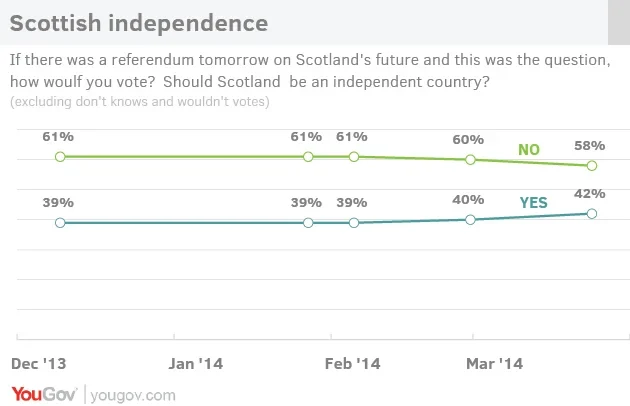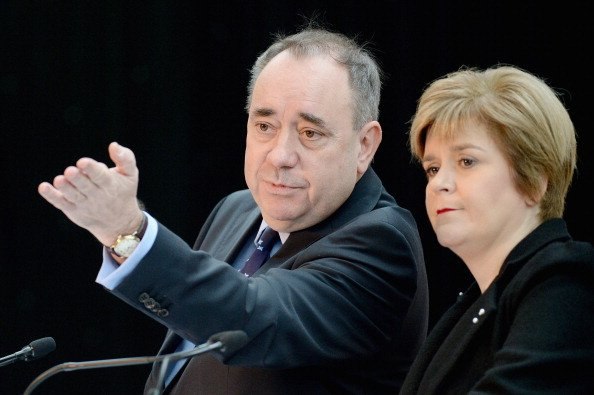Support for Scottish independence is at the highest level that YouGov has recorded to date, and the main reason is that Alex Salmond has started to shift opinion among Scotland’s women
Our latest survey for The Times shows that 37% of all Scots would vote yes, while 52% would vote no.
The ‘no’ vote has remained steady. This is the fifth survey that YouGov has conducted since early December. In each one, the ‘no’ vote has been 52 or 53%. But the ‘yes’ vote has been creeping up, from 33% before Christmas to 37% now, as ‘don’t knows’ have started to jump off the fence.
When we exclude ‘don’t knows’ and count only those who take sides, the ‘no’ lead has slipped from 61-39% before Christmas to 58-42% today.

The biggest shift has been among women. One of the features of the campaign so far has been the huge gender gap, with men only narrowly favouring the union, and women overwhelmingly opposed to independence. The gap remains big, but it is not as vast as it used to be. A month ago, women opposed independence by 68-32%; now the figure is 62-38%. Men divide 54-46% in favour of the union, little changed on our last two surveys.
What has happened? It’s not that there has been a surge in female support for the SNP. Their voting intentions for Holyrood are virtually unchanged.
Nor is it that women are coming round to the belief that they will personally better off in an independent Scotland. Just 17% expect this, much the same as the 16% we recorded when we last asked this question in December. Far more, 40%, expect to be worse off.
What has changed is what women expect for Scotland as a whole. Three months ago, 52% of women thought Scotland’s economy would suffer under independence, while just 22% expected things to improve – a vast 30-point chasm. Today, the gap has almost halved to 18 points, with 45% of women fearing that the economy would get worse, and 27% expecting it to get better. Once again, there has been little shift in the answers men give (33% worse, 44% better in our latest survey).
One possible explanation for the shift among Scotland’s women is that Alex Salmond has acted on past warnings of his lack of female support for independence. He has unveiled a new strategy for child care, offering a significant expansion if Holyrood wins full powers to tax and spend as it pleased.
It’s not often that a single policy statement changes votes. It is more likely that Salmond’s new policy has helped to counter a more widespread, perhaps sub-conscious, sense that independence is a macho project with risks that men are more willing to take. It could be that some women, hitherto nervous about independence, find a reassurance in Salmond’s child care policy that goes beyond the specific benefits that would go to families with young children.
The big question now is whether Salmond can maintain this momentum. He will need to do more than win over the don’t knows. He must persuade a number of people now planning to vote ‘no’ to switch sides. That has not happened in recent weeks to any significant extent. Coming polls will tell us whether he is able to assault his opponents’ seemingly solid fortress.
Image: Getty






